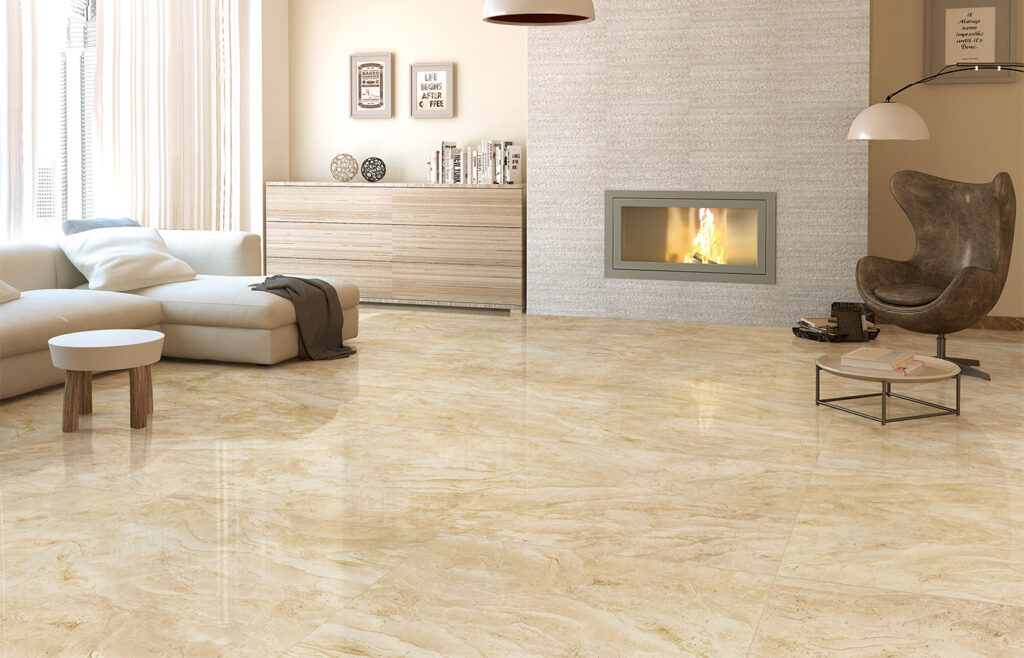Suppose you review different flooring options for your new home or an upcoming renovation project. In that case, you might give porcelain floor tiles careful consideration – especially if you plan to use them in high-traffic or wet areas, such as kitchens, hallways, bathrooms, etc. The integral elegance and simplicity of the porcelain floor tiles, combined with implausible durability and versatility, have drawn the attention of several homeowners and contemporary interior designers worldwide.
Created from porcelain clay and fired at a very high temperature, porcelain floor tiles have an inspiring finish quality, strength, and durability. Available in glazed and unglazed variants and a wide range of shades and styles, these rugged and highly versatile floor tiles can be used in various indoor and outdoor applications to enhance the architectural design and add value. Porcelain floor tiles, in particular, have become a prominent feature in modern homes around the globe.
However, before you decide on porcelain floor tiles for your home, you need to become aware of its specifics, advantages, and drawbacks.
Related: The 12 Types of Floor Tiles for Modern Flooring

Pros and Cons of Porcelain Tile Flooring
Porcelain floor tiles are often referred to as the more contemporary variety of ceramic floor tiles. Both tiles are very similar, but unlike ceramic, porcelain is made from a more refined clay mixture and is fired at higher temperatures. That results in a more solid, more scratch- and stain-resistant finish and a more rigid, denser material with less than 0.5% water absorption rate. The density and composition of the porcelain floor tiles allow them to withstand traffic without any damage to their good-looking appearance and functionality.
Benefits of Porcelain Floor Tiles
Outstanding durability
Due to its unique composition and the specifics of the manufacturing process, porcelain is more robust and denser than most other household materials (even harder than granite). Therefore, porcelain floor tiles are highly resistant to the worrisome heavy impact stresses and unlikely to break under pressure. Also, they don’t crack due to the cold. Their finish can last a lifetime, even in harsh weather conditions and heavy-traffic areas.
Water-resistance
Porcelain is less likely to absorb moisture than other flooring materials – its great density makes it highly resistant to liquid penetration, mainly when glazed. Therefore, porcelain floor tiles can last for decades, even in humid environments (such as the bathroom);
Stain-resistance and excellent hygiene
Spills cannot enter the dense, non-porous tile material, making porcelain floor tiles naturally stain-resistant. When glazed, the floor tiles become virtually impossible to hold stain. What’s more? The non-porous porcelain tiles do not harbor mold and bacteria growth, which makes it hygienic and suitable for use in modern baths and kitchens (for countertops, wall coverings, and flooring alike);
Low maintenance
Porcelain’s natural stain and water resistance make it very easy to clean and maintain. You can clean spills that might seep into more porous materials and cause persistent stains to remain on the porcelain tiles’ surface with nothing more than a damp cloth. Mopping your porcelain floor tile with a solution of mild detergent and water once in a while is all that it takes to disinfect the area and keep it in excellent condition;
Easy repair
Not only does porcelain flooring have an incredibly long lifespan, but it is also easy to repair in the unlikely event of damage. If a tile cracks, it can be removed and replaced (it’s advisable to save an extra box of floor tiles when installing a new porcelain floor to make color matching easier if you need to replace a new whole tile later.
Consistent color and design
The color and design of a porcelain tile run through the whole tile, so it will retain its look as it wears down. Besides, if a tile chip (which is highly improbable), the damage will remain unnoticeable
Increased home value
Porcelain is renowned as a quality building material, so including it in your home will significantly increase the property’s value.
Disadvantages of Porcelain Tile Flooring
- Weight – The high density of porcelain floor tiles makes them very heavy. That results in a complicated installation process and restricts porcelain flooring on the upper levels unless it is strong enough to support the extra weight.
- Complex installation – Porcelain is heavy, rugged, and extremely difficult to cut, making the installation process quite laborious and time-consuming. Therefore, attempting a DIY installation may easily result in expensive material waste and severe headaches. Hiring professionals, on the other hand, will increase the overall cost of the project (the installation expenses can add about 25% – 50% to the total cost depending on the location and specifics of the project);
- High price – Porcelain is quite expensive, so opting for porcelain floor tiles will cost you more than other standard flooring options (such as ceramic tiles, for example). However, this type of floor can last for decades, so it is worth the investment.
- Vulnerable grouts – Porcelain floor tiles are easy to care for. Still, the lines between the tiles (the grouts) are complicated to keep fresh and clean. Grout is a porous material that can be easily corrupted by humidity and insidious moisture. That may quickly result in mold and mildew unless the grout is sealed correctly.
Now that you’re aware of porcelain’s primary advantages and disadvantages, you need to know what exactly to look for when choosing porcelain tiles for your home.
Selection Guide for Porcelain Floor Tiles
The first step in selecting the best porcelain tiles for your particular needs is to match the tile to its intended use. Then, you can turn your attention to the aesthetic aspect of your project.
Find the class of porcelain floor tiles you need.
Porcelain is rated in five classes to help classify its durability and functionality. Class 1 is the weakest type of porcelain that is only suitable for wall tiles. Classes 2 and 3 are appropriate for light traffic areas, such as residential floors with little or no exposure to scratching dirt (such as bathrooms). Class 4 is excellent for medium to high traffic areas, such as entryways, halls, and kitchens. Class 5 is for heavy traffic and commercial use;
Check the coefficient of friction and the absorption rate of the floor tiles.
Floor tiles should be nonslip and highly resistant to spills and stains. Therefore, you need porcelain tiles with a coefficient of 0.06 friction for the floors in your home to ensure your and your family’s safety. Also, have in mind that tiles for bathroom floors and other floors subject to moisture, as well as tiles used in and around swimming pools, must be impervious to liquid penetration so that water and other fluids do not penetrate and stain them;
Choose between glazed and unglazed porcelain floor tiles.
Unglazed tiles have a consistent color throughout the tile, so they will look the same as the surface wears over the years. They come in a variety of finishes, from rough to polished;
Glazed porcelain floor tiles have a protective coating that creates a waterproof barrier over them. That layer is nonabsorbent and highly resistant to stains. Glazed porcelain tiles are manufactured in an array of vivid colors and decorative patterns and can have a shiny or matte finish;
Choose the color and texture that will work for you.
It is the color and texture of the porcelain floor tiles that define the overall atmosphere in the room. You can easily find the kind of tiles that will create the impression you’re looking for – both glazed and unglazed porcelain floor tiles are available in various colors and come with beautiful decorative ornamentation. You can choose from a uniform appearance, slight variation of color and tone (different texture or patterns within similar hues), or random color differences from tile to tile that create a unique, artistic installation.
Decide on the shape and size of porcelain tiles you want to use for your floor.
Remember that rectangular tiles are easier to install than irregularly shaped ones. In contrast, more unusual shapes enable for more interesting, exquisite patterns. Also, don’t forget that it’s much easier and faster to lay several larger tiles instead of dozens of small tiles (installing smaller tiles requires plenty of time and great accuracy with placement and grout joints).
Porcelain Floor Tiles Care and Maintenance
The nature of these floor tiles forms the reason they are tremendously easy to clean. Get warm water and a soft brush or sponge. They are usually enough to keep your porcelain floor tiles looking spotless at all times. Make sure you sweep any dirt and debris from the floor before mopping it. When you decide to practice a more thorough cleaning, ensure you use a neutral pH cleaner that will not compromise the finish, and don’t forget to thoroughly rinse the surface with clear water.
More to read: Pros and Cons of Porcelain Floor Tiles

